steering wheel MERCEDES-BENZ CLK55AMG 2001 C208 Owner's Manual
[x] Cancel search | Manufacturer: MERCEDES-BENZ, Model Year: 2001, Model line: CLK55AMG, Model: MERCEDES-BENZ CLK55AMG 2001 C208Pages: 329, PDF Size: 11.53 MB
Page 4 of 329

1 Contents
IntroductionProduct information .......................... 7
Operator’s manual ............................. 8
Where to find it ................................ 13
Reporting Safety Defects ................ 15Instruments and controlsInstruments and controls ............... 18
Center console .............................. 20
Overhead control panel ............... 21OperationVehicle keys ...................................... 24
Start lock-out .................................... 27
General notes on the
central locking system ............... 27
Central locking system ................... 28
Radio frequency and infrared
remote control .............................. 28
Opening and closing windows
and sliding/pop-up roof from
outside ........................................... 32Panic button ................................. 33
Mechanical keys .......................... 33
Doors ................................................. 34
Central locking switch .................... 36
Automatic central locking .......... 37
Emergency unlocking in
case of accident .......................... 37
Trunk ................................................. 38
Trunk lid release switch ................ 40
Trunk lid emergency
release ...........................................41
Antitheft alarm system ................... 42
Tow-away alarm ............................... 44
Power seats, front ............................ 45
Front head restraints ...................51
Rear head restraints .................... 52
Backrest ............................................ 54
Multicontour seat ............................ 55
Heated seats ..................................... 56
Seat belts and integrated
restraint system .......................... 58
Seat belts .......................................... 58
Seat belt nonusage
warning system ............................ 59BabySmart
TM airbag
deactivation system .................... 65
Self-test BabySmart
TM without
special child seat installed ......... 65
Supplemental restraint
system (SRS) ................................ 66
Emergency tensioning
retractor (ETR) ............................. 66
Airbags .............................................. 67
Safety guidelines for the
seat belt, emergency
tensioning retractor
and airbag ..................................... 73
Infant and child
restraint systems .......................... 75
Adjusting telescoping
steering column .......................... 78
Inside rear view mirror .................. 79
Exterior rear view mirrors ............. 80
Instrument cluster ........................... 84
Indicator lamps in the
instrument cluster ...................... 86
Multifunction steering wheel,
multifunction display ................. 90
Page 8 of 329

5 ContentsChanging batteries in the
electronic main key ..................283
Synchronizing
remote control ............................285
Emergency operation of
sliding/pop-up roof ...................286
Manual release for
fuel filler flap .............................287
Replacing wiper blade
insert ...........................................287
Trunk lamp .....................................289
Roof rack .........................................289
Vehicle careCleaning and care
of the vehicle ............................. 292
Power washer ............................. 293
Tar stains .................................... 293
Paintwork, painted body
components ................................ 293
Engine cleaning ......................... 294
Vehicle washing ......................... 294
Ornamental moldings ............... 294
Headlamps, taillamps,
turn signal lenses ...................... 294Window cleaning .......................295
Wiper blade .................................295
Light alloy wheels ......................295
Instrument cluster .....................295
Steering wheel and
gear selector lever ......................295
Cup holder ...................................296
Seat belts .....................................296
Hard plastic trim items .............296
Headliner and shelf below
rear window ................................296
Upholstery ...................................296
Plastic and rubber parts ............296
Page 22 of 329
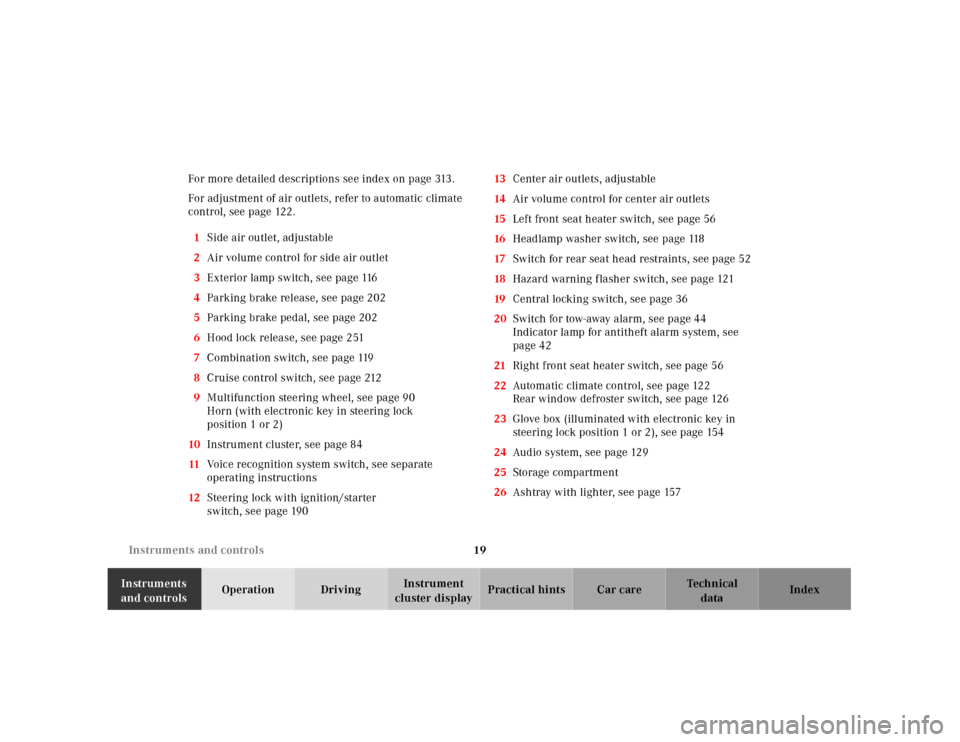
19 Instruments and controls
Te ch n ica l
data Instruments
and controlsOperation DrivingInstrument
cluster displayPractical hints Car care Index For more detailed descriptions see index on page 313.
For adjustment of air outlets, refer to automatic climate
control, see page 122.
1Side air outlet, adjustable
2Air volume control for side air outlet
3Exterior lamp switch, see page 116
4Parking brake release, see page 202
5Parking brake pedal, see page 202
6Hood lock release, see page 251
7Combination switch, see page 119
8Cruise control switch, see page 212
9Multifunction steering wheel, see page 90
Horn (with electronic key in steering lock
position 1 or 2)
10Instrument cluster, see page 84
11Voice recognition system switch, see separate
operating instructions
12Steering lock with ignition/starter
switch, see page 19013Center air outlets, adjustable
14Air volume control for center air outlets
15Left front seat heater switch, see page 56
16Headlamp washer switch, see page 118
17Switch for rear seat head restraints, see page 52
18Hazard warning flasher switch, see page 121
19Central locking switch, see page 36
20Switch for tow-away alarm, see page 44
Indicator lamp for antitheft alarm system, see
page 42
21Right front seat heater switch, see page 56
22Automatic climate control, see page 122
Rear window defroster switch, see page 126
23Glove box (illuminated with electronic key in
steering lock position 1 or 2), see page 154
24Audio system, see page 129
25Storage compartment
26Ashtray with lighter, see page 157
Page 25 of 329
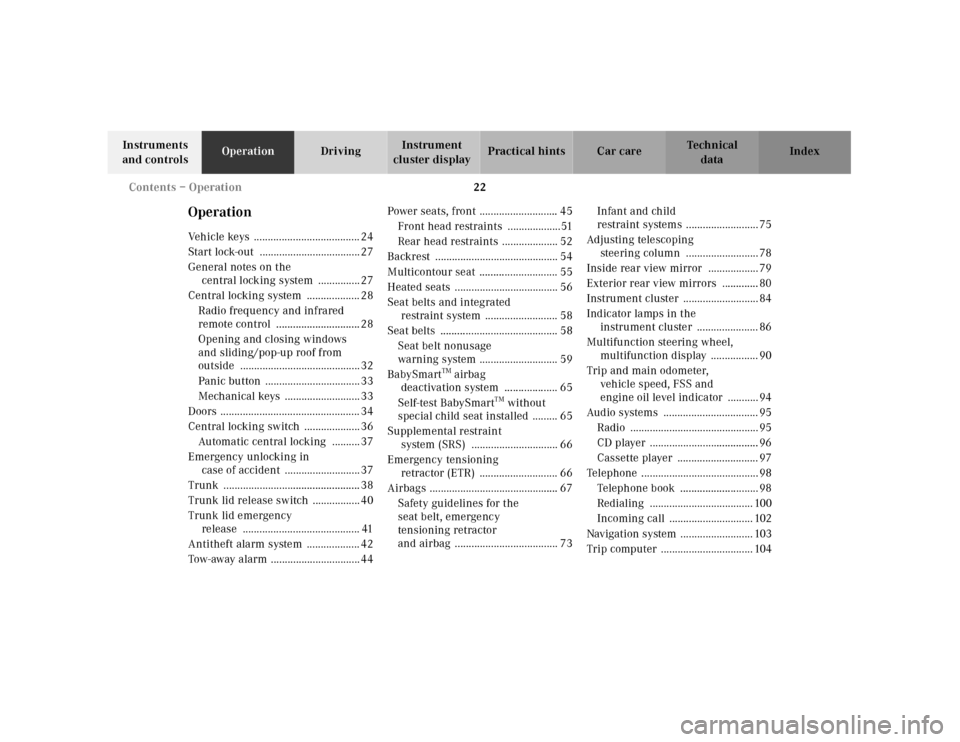
22 Contents – Operation
Te ch n ica l
data Instruments
and controlsOperationDrivingInstrument
cluster displayPractical hints Car care Index
OperationVehicle keys ...................................... 24
Start lock-out .................................... 27
General notes on the
central locking system ............... 27
Central locking system ................... 28
Radio frequency and infrared
remote control .............................. 28
Opening and closing windows
and sliding/pop-up roof from
outside ........................................... 32
Panic button .................................. 33
Mechanical keys ........................... 33
Doors .................................................. 34
Central locking switch .................... 36
Automatic central locking .......... 37
Emergency unlocking in
case of accident ........................... 37
Trunk ................................................. 38
Trunk lid release switch ................. 40
Trunk lid emergency
release .......................................... 41
Antitheft alarm system ................... 42
Tow-away alarm ................................ 44Power seats, front ............................ 45
Front head restraints ...................51
Rear head restraints .................... 52
Backrest ............................................ 54
Multicontour seat ............................ 55
Heated seats ..................................... 56
Seat belts and integrated
restraint system .......................... 58
Seat belts .......................................... 58
Seat belt nonusage
warning system ............................ 59
BabySmart
TM airbag
deactivation system ................... 65
Self-test BabySmart
TM without
special child seat installed ......... 65
Supplemental restraint
system (SRS) ............................... 66
Emergency tensioning
retractor (ETR) ............................ 66
Airbags .............................................. 67
Safety guidelines for the
seat belt, emergency
tensioning retractor
and airbag ..................................... 73Infant and child
restraint systems .......................... 75
Adjusting telescoping
steering column .......................... 78
Inside rear view mirror .................. 79
Exterior rear view mirrors ............. 80
Instrument cluster ........................... 84
Indicator lamps in the
instrument cluster ...................... 86
Multifunction steering wheel,
multifunction display ................. 90
Trip and main odometer,
vehicle speed, FSS and
engine oil level indicator ........... 94
Audio systems .................................. 95
Radio .............................................. 95
CD player ....................................... 96
Cassette player ............................. 97
Telephone .......................................... 98
Telephone book ............................ 98
Redialing ..................................... 100
Incoming call .............................. 102
Navigation system .......................... 103
Trip computer ................................. 104
Page 40 of 329
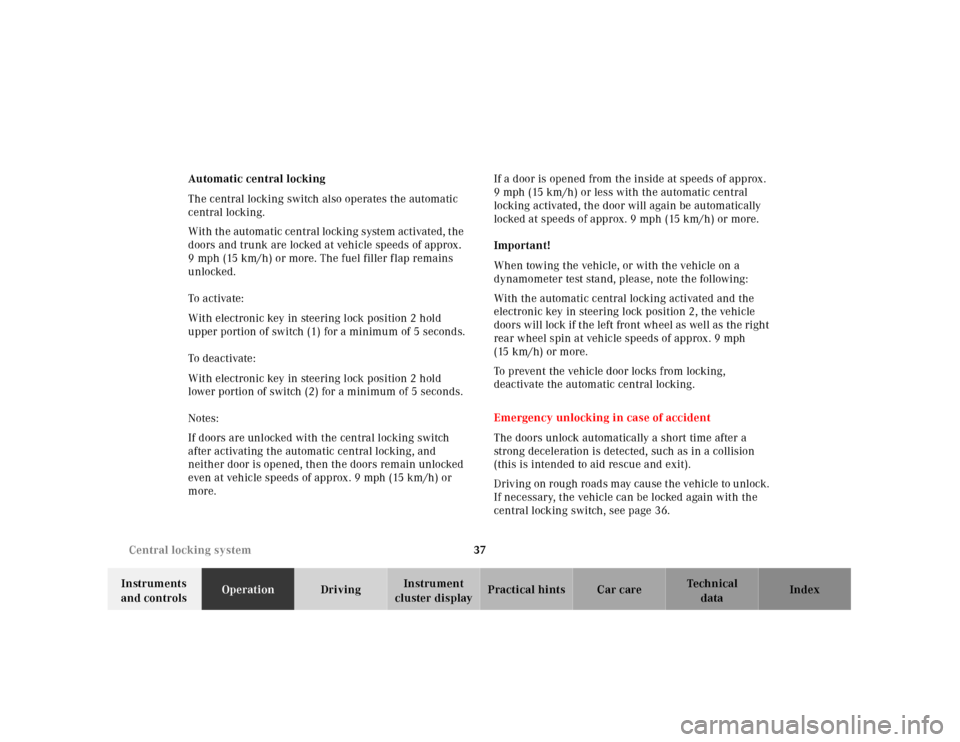
37 Central locking system
Te ch n ica l
data Instruments
and controlsOperationDrivingInstrument
cluster displayPractical hints Car care Index Automatic central locking
The central locking switch also operates the automatic
central locking.
Wit h th e automa tic central locking system activated, t he
doors and trunk are locked at vehicle speeds of approx.
9 mph (15 km/h) or more. The fuel filler f lap remains
unlocked.
To a ctiva te:
With electronic key in steering lock position 2 hold
upper portion of switch (1) for a minimum of 5 seconds.
To dea cti vate :
With electronic key in steering lock position 2 hold
lower portion of switch (2) for a minimum of 5 seconds.
Notes:
If doors are unlocked with the central locking switch
after activating the automatic central locking, and
neither door is opened, then the doors remain unlocked
even at vehicle speeds of approx. 9 mph (15 km/h) or
more.If a door is opened from the inside at speeds of approx.
9 mph (15 km/h) or less with the automatic central
locking activated, the door will again be automatically
locked at speeds of approx. 9 mph (15 km/h) or more.
Important!
When towing the vehicle, or with the vehicle on a
dynamometer test stand, please, note the following:
With the automatic central locking activated and the
electronic key in steering lock position 2, the vehicle
doors will lock if the left front wheel as well as the right
rear wheel spin at vehicle speeds of approx. 9 mph
(15 km/h) or more.
To prevent the vehicle door locks from locking,
deactivate the automatic central locking.
Emergency unlocking in case of accident
The doors unlock automatically a short time after a
strong deceleration is detected, such as in a collision
(this is intended to aid rescue and exit).
Driv ing on rou gh road s m ay cau se t he vehicle to u nl ock.
If necessary, the vehicle can be locked again with the
central locking switch, see page 36.
Page 49 of 329
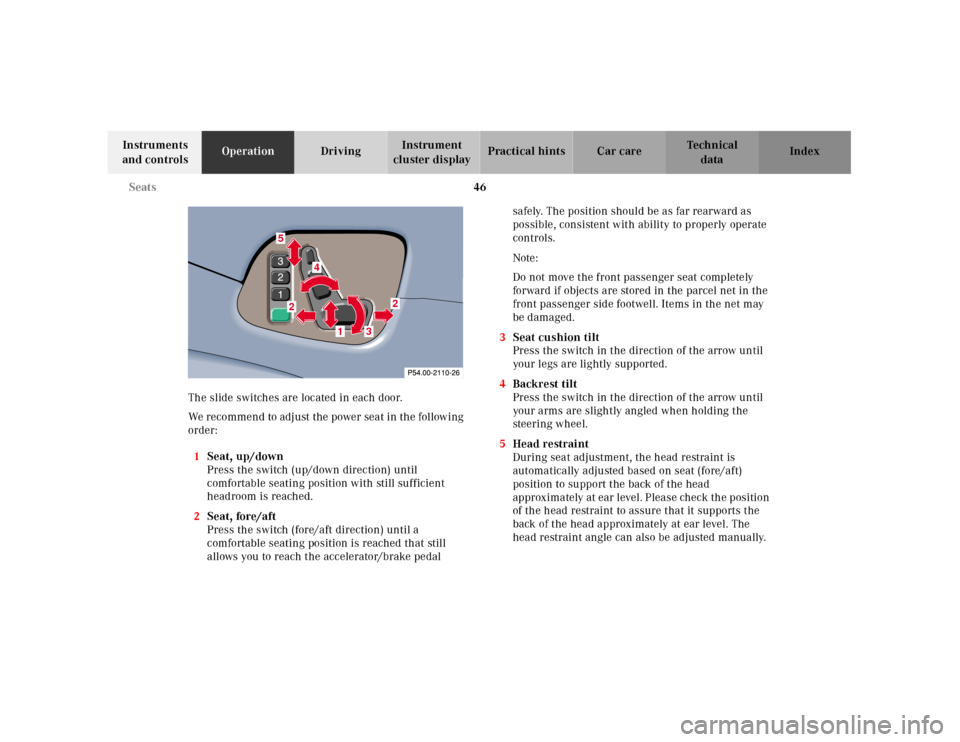
46 Seats
Te ch n ica l
data Instruments
and controlsOperationDrivingInstrument
cluster displayPractical hints Car care Index
The slide switches are located in each door.
We recommend to adjust the power seat in the following
order:
1Seat, up/down
Press the switch (up/down direction) until
comfortable seating position with still sufficient
headroom is reached.
2Seat, fore/aft
Press the switch (fore/aft direction) until a
comfortable seating position is reached that still
allows you to reach the accelerator/brake pedal safely. The position should be as far rearward as
possible, consistent with ability to properly operate
controls.
Note:
Do not move the front passenger seat completely
forward if objects are stored in the parcel net in the
front passenger side footwell. Items in the net may
be damaged.
3Seat cushion tilt
Press the switch in the direction of the arrow until
your legs are lightly supported.
4Backrest tilt
Press the switch in the direction of the arrow until
your arms are slightly angled when holding the
steering wheel.
5Head restraint
During seat adjustment, the head restraint is
automatically adjusted based on seat (fore/aft)
position to support the back of the head
approxima tely at ear l evel . Plea se check th e position
of the head restraint to assure that it supports the
back of the head approximately at ear level. The
head restraint angle can also be adjusted manually.
87
4
52
2
1
3
Page 50 of 329
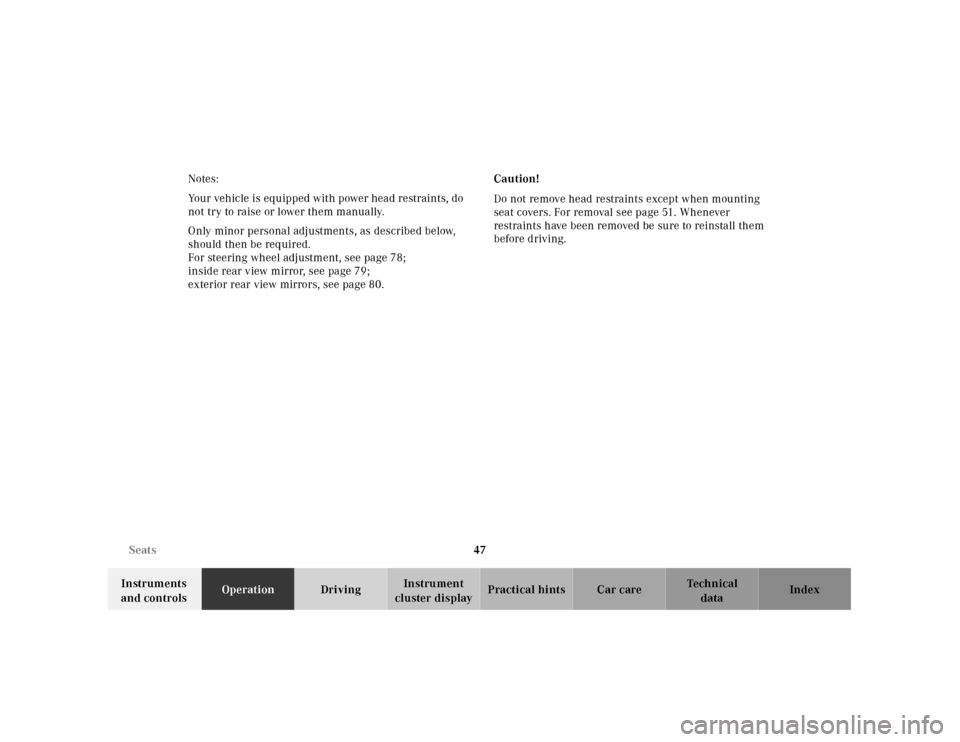
47 Seats
Te ch n ica l
data Instruments
and controlsOperationDrivingInstrument
cluster displayPractical hints Car care Index Notes:
Your vehicle is equipped with power head restraints, do
not try to raise or lower them manually.
Only minor personal adjustments, as described below,
should then be required.
For steering wheel adjustment, see page 78;
inside rear view mirror, see page 79;
exterior rear view mirrors, see page 80.Caution!
Do not remove head restraints except when mounting
seat covers. For removal see page 51. Whenever
restraints have been removed be sure to reinstall them
before driving.
Page 53 of 329
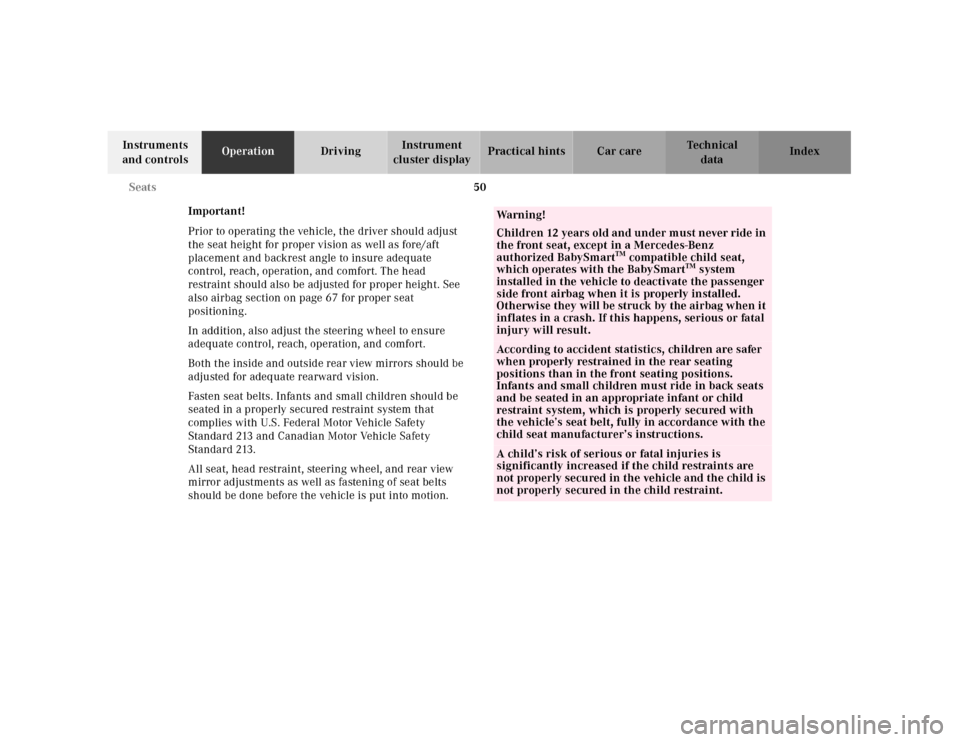
50 Seats
Te ch n ica l
data Instruments
and controlsOperationDrivingInstrument
cluster displayPractical hints Car care Index
Important!
Prior to operating the vehicle, the driver should adjust
the seat height for proper vision as well as fore/aft
placement and backrest angle to insure adequate
control, reach, operation, and comfort. The head
restraint should also be adjusted for proper height. See
also airbag section on page 67 for proper seat
positioning.
In addition, also adjust the steering wheel to ensure
adequate control, reach, operation, and comfort.
Both the inside and outside rear view mirrors should be
adjusted for adequate rearward vision.
Fasten seat belts. Infants and small children should be
seated in a properly secured restraint system that
complies with U.S. Federal Motor Vehicle Safety
Standard 213 and Canadian Motor Vehicle Safety
Standard 213.
All seat, head restraint, steering wheel, and rear view
mirror adjustments as well as fastening of seat belts
should be done before the vehicle is put into motion.
Wa r n i n g !
Children 12 years old and under must never ride in
the front seat, except in a Mercedes-Benz
authorized BabySmart
TM compatible child seat,
which operates with the BabySmart
TM system
installed in the vehicle to deactivate the passenger
side front airbag when it is properly installed.
Otherwise they will be struck by the airbag when it
inflates in a crash. If this happens, serious or fatal
injury will result.
According to accident statistics, children are safer
when properly restrained in the rear seating
positions than in the front seating positions.
Infants and small children must ride in back seats
and be seated in an appropriate infant or child
restraint system, which is properly secured with
the vehicle’s seat belt, fully in accordance with the
child seat manufacturer’s instructions.A child’s risk of serious or fatal injuries is
significantly increased if the child restraints are
not properly secured in the vehicle and the child is
not properly secured in the child restraint.
Page 70 of 329
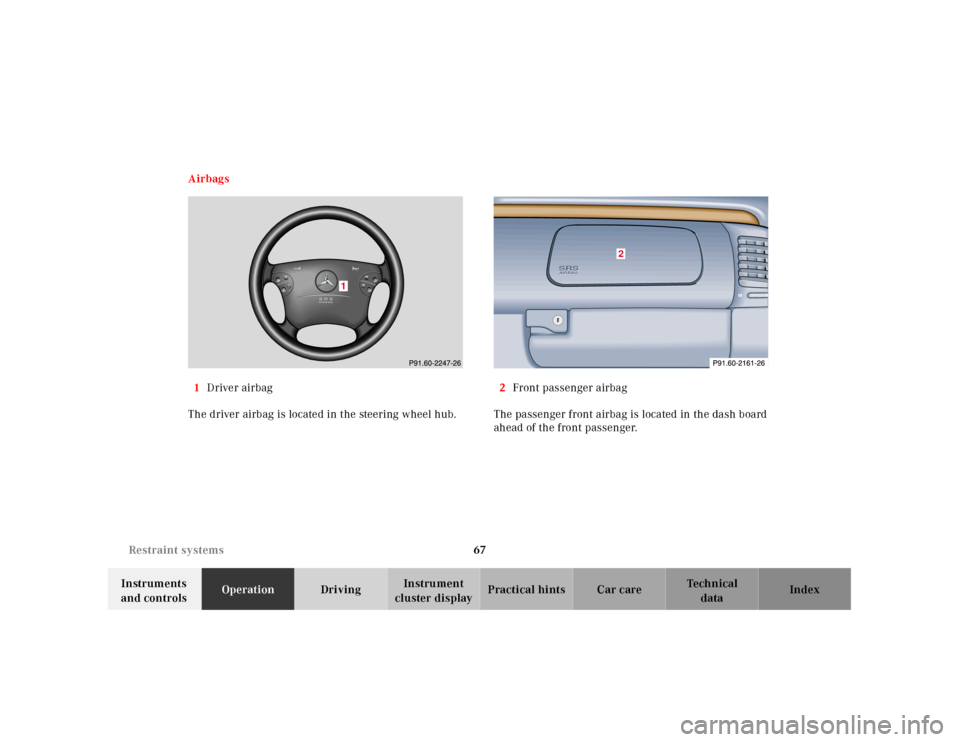
67 Restraint systems
Te ch n ica l
data Instruments
and controlsOperationDrivingInstrument
cluster displayPractical hints Car care Index Airbags
1Driver airbag
The driver airbag is located in the steering wheel hub. 2Front passenger airbag
The passenger front airbag is located in the dash board
ahead of the front passenger.
1
SRSAIRBAGSRSAIRBAG
2
Page 74 of 329
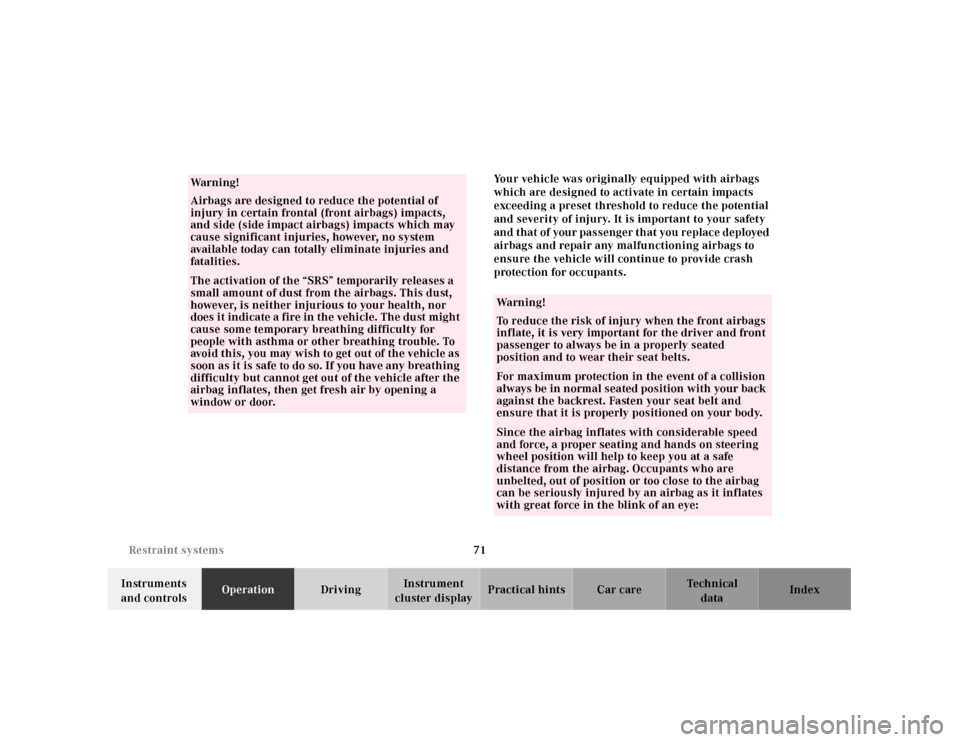
71 Restraint systems
Te ch n ica l
data Instruments
and controlsOperationDrivingInstrument
cluster displayPractical hints Car care IndexYour vehicle was originally equipped with airbags
which are designed to activate in certain impacts
exceeding a preset threshold to reduce the potential
and severity of injury. It is important to your safety
and that of your passenger that you replace deployed
airbags and repair any malfunctioning airbags to
ensure the vehicle will continue to provide crash
protection for occupants.
Wa r n i n g !
Airbags are designed to reduce the potential of
injury in certain frontal (front airbags) impacts,
and side (side impact airbags) impacts which may
cause significant injuries, however, no system
available today can totally eliminate injuries and
fatalities.The activation of the “SRS” temporarily releases a
small amount of dust from the airbags. This dust,
however, is neither injurious to your health, nor
does i t indi cate a fire in th e vehi cle. Th e du st migh t
cause some temporary breathing difficulty for
people with asthma or other breathing trouble. To
avoid this, you may wish to get out of the vehicle as
soon as it is safe to do so. If you have any breathing
difficulty but cannot get out of the vehicle after the
airbag inflates, then get fresh air by opening a
window or door.
Wa r n i n g !
To reduce the risk of injury when the front airbags
inflate, it is very important for the driver and front
passenger to always be in a properly seated
position and to wear their seat belts.For maximum protection in the event of a collision
always be in normal seated position with your back
against the backrest. Fasten your seat belt and
ensure that it is properly positioned on your body.Since the airbag inflates with considerable speed
and force, a proper seating and hands on steering
wheel position will help to keep you at a safe
distance from the airbag. Occupants who are
unbelted, out of position or too close to the airbag
can be seriously injured by an airbag as it inflates
with great force in the blink of an eye: